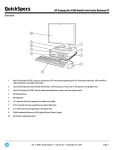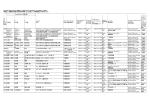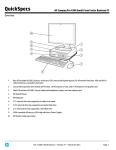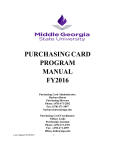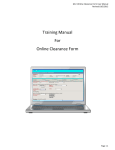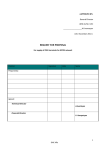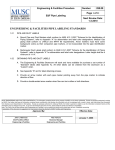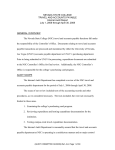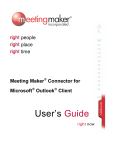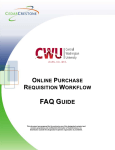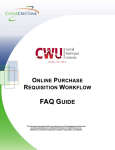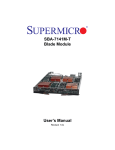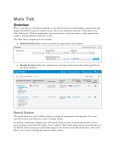Download P-Card Manual - FSU Film School
Transcript
PURCHASING CARD USER’S POLICY MANUAL FSU PROCURMENT SERVICES Revised July 2014 Florida State University Purchasing Card Manual INDEX 1. Program Contacts 3 2. General Program Information 4 3. Program Guidelines 5 4. Procedures for Deans/Directors, Supervisors, Budget Managers 11 5. Procedures for Cardholders 12 6. Procedures for Proxies 13 7. Purchasing Procedures and Contracts 14 8. Special Conditions and Disallowed Purchases 15 9. Glossary 17 10. Frequently Asked Questions 18 FORMS 11. Receipt Replacement Form Online 12. Statement of Disputed Item Online 13. Cardholder Termination Form Online 14. Proxy Termination Form Online 2 Florida State University Purchasing Card Manual Purchasing Card Program Contacts PROCUREMENT SERVICES ADMINISTRATORS (PROCUREMENT) Nancy Milburn Tonya Kling Phyllis Sullivan FSU Purchasing Card Program Manager and Administrator Cardholder Training, Application Review, Processing & Setup Purchasing Card Assistant Administrator Cardholder Training, Application Review, Processing & Setup Purchasing Card Assistant Administrator 850/ 644-9725 [email protected] 850/ 645-5637 [email protected] 850/ 644-9726 [email protected] PAYABLES AND DISBURSEMENTS ADMINISTRATORS (PAYABLES) Justin Kraft FSU Payer/Approver, Payment Processing, Audits 850/ 644-3943 [email protected] Joy Henderson FSU Payer/Approver, Payment Processing, Audits 850/ 644-5481 [email protected] Walter Brady FSU Payer/Approver, Payment Processing, Audits 850/ 644-5294 [email protected] BANK OF AMERICA CONTACT NUMBER Help Desk (questions, report lost or stolen cards, etc.) 3 1-800-300-3084 Florida State University Purchasing Card Manual General Program Information The procedures contained in this manual apply to all university employees who have been issued a Florida State University Purchasing Card (P-Card) or who have direct or delegated responsibilities under the P-Card system. I. GENERAL P-Cards may only be used for commodities for official, state-related purposes. Purchases must follow appropriate FSU policies, state laws and the published Expenditure Guidelines and must be made with reasonable judgment. If there is a question about the official purpose of a purchase, or if the use of the P-Card to make a purchase is questionable, contact the P-Card Administrators (Procurement) at (850) 644-6850 or the numbers listed on page 3 for clarification prior to making the purchase. Cardholder and Cardholder/Approver Eligibility: The FSU P-Card will be made available to all permanent USPS, A&P, OPS (must provide current FSU Employee ID reflecting employment status with application) or Faculty members, with the consent of the person’s Dean or Department Head and supervisor. FSU P-Card cardholders, and those who are appointed to approve the charges made to the card, must be individuals of unquestioned honesty and integrity, who have consistently demonstrated the ability and willingness to follow University policies and procedures. Individuals who do not meet all of the above criteria shall not be issued a P-Card, and shall not be named to approve the charges of others. The P-Card is not a status symbol, and should not be treated as such. It should be issued only to individuals who are responsible for making purchases on behalf of their departments. It requires the cardholder to know purchasing rules and regulations and to be organized to the extent that complete records of all payments are available for audit at any time, without prior notification. Having a P-Card is a privilege, not a right. The privilege may be withdrawn at any time, with good reason. The card may be suspended pending retraining, or it may be permanently revoked. As part of the cardholder application process, the cardholder will be advised of all their rights and responsibilities, including the possibility of firing, for misuse of the card. ITEMS AVAILABLE ON FSU AND/OR STATE CONTRACTS MUST BE PURCHASED FROM THOSE MERCHANTS/VENDORS, UNLESS THE NEEDED COMMODITIES OR COMPARABLE ITEMS ARE NOT AVAILABLE THROUGH UNIVERSITY OR STATE CONTRACTS. Any employee who knowingly and willingly makes purchases or attempts to make purchases that violate state laws, university P-Card policy, procedures contained in this manual or assists another employee in such purchases, or fails to report the violation, may be subject to disciplinary action in accordance with Cardholder Agreement and the policies of the University. The Office of Inspector General Services will be notified of these attempts. Contact P-Card Administrator (Procurement) at (850) 644-6850 for non-routine or questionable purchases before the purchase is made. For example, computer software/hardware that must meet specific requirements, critical delivery schedules, or assurance of compatibility with existing equipment, requires the use of a purchase order to ensure that specifications are met. All transactions conducted within the State of Florida are exempt from State Sales and Use tax. The tax-exempt number is listed on each P-Card. Federal or local taxes are not exempt. The cardholder should always inform the merchant that the purchase is tax-exempt before the card is swiped and ensure they are not charged taxes before 4 Florida State University Purchasing Card Manual signing any receipt. If taxes are charged, the cardholder should ensure the merchant removed the taxes prior to signing any receipt. Online purchases shipped to a Florida address are tax exempt. Merchants are not authorized to charge the P-Card until they have shipped the merchandise to the cardholder. Cardholders must make the vendors aware of this requirement. The merchant should ship the delivery receipt and the item purchased directly to the cardholder or designated departmental receiving point. All receipts will be maintained at the department level. DO NOT INSTRUCT OR ALLOW ANY VENDOR TO SHIP ITEMS TO THE FSU CENTRAL RECEIVING OFFICE OR THE PROCUREMENT SERVICES DEPARTMENT. Audits University Controller, Office of Inspector General Services, Procurement Services and the state of Florida auditors will perform periodic post audits of P-Card activity. These audits will be performed on an unscheduled basis and without prior notice to the department. P-Cards will be immediately cancelled and destroyed for the following reasons: II. Cardholder terminates employment or transfers departments within the Florida State University; Cardholder no longer requires a P-Card Cardholder reports the loss or theft of P-Card Cardholder misuses the P-Card GUIDELINES A. Card Issuance and Cancellation The P-Card Administrator (Procurement) is responsible for all card issuance and cancellation. Eligible employees may apply for a card by using the “Commodity Card Cardholder Application” form. Their Dean, Director, or Department Head, Budget Manager, and immediate supervisor must also sign the form. Cards must be returned to the P-Card Administrator (Procurement) on a Cardholder Termination Form when cardholder changes departments within the University or terminates employment with the University, or when cardholder no longer requires a card. . B. P-Card Limitations and Restrictions Card profiles are determined and set by the P-Card Administrators (Procurement). Card profiles determine how the card may be used. The P-Card Administrators (Procurement) are responsible for establishing and changing card profiles. 5 Florida State University Purchasing Card Manual C. Cardholder Transaction Limits Cardholder Limits Default Mid-Level* Highest Level* Individual Transaction Limit (per vendor per day) $999 $2500 $4000 Daily Dollar Limit: $3000 $7500 $10,000 *Dean/Director/Department Head approval required to obtain these levels Note: Cardholders must ensure charges are not split to avoid above limits (Splitting a transaction is when a cardholder allows a merchant to take a higher dollar transaction and process it in multiple lower dollar transactions to avoid the transaction limit.) D. Cash Advances Under no circumstances are cash advances on the FSU P-Card allowed. E. P-Card Security Use of the P-Card is limited to the University employee whose name appears on the face of the card. The P-Card should not be loaned to another person under any circumstances. If a cardholder is absent for a period of time, the department should seek to obtain another card for a different designated employee, either temporarily or permanently. Any cardholder sharing their card information or allowing another individual to use their card for purchases may have their cardholder privileges revoked and a strike issued to the cardholder (see strike policy on pg. 9 for details). CARDHOLDERS MUST NEVER GIVE THEIR P-CARD TO ANYONE ELSE TO MAKE PURCHASES OR SHARE THEIR CARD INFORMATION WITH ANYONE. Each cardholder is responsible for the security of his/her card. All precautions should be used to maintain confidentiality of all information relating to the card, such as the cardholder account number and expiration date. The account number should never be left in a conspicuous place. F. Receipt Requirements Receipts are a critical part of the P-Card program. Accurate, detailed records of P-Card purchases allow the P-Card Team, University and State auditors to verify and audit charges for compliance with University and State policies, rules and statutes. Receipts and other documentation must be kept for all purchases. A receipt may be a(n): Cash Register or Sales Receipt Invoice Registration Form Packing List – with cost listed for each item Depending on the circumstances of the purchase: o Confirmation – for payment 6 Florida State University Purchasing Card Manual o o E-mail Completed web or mail order form/confirmation – indicating purchase paid with credit card Receipts must include the following specific information. If the receipt provided does not contain the following, the Cardholder must contact the vendor to obtain a more detailed receipt: Unit cost of each item purchased Description of each item purchased Total cost of purchase Vendor name and preferably a vendor address Date of purchase Lost or Missing Receipts: Cardholder is responsible for obtaining a duplicate receipt from the vendor If a duplicate cannot be obtained, the cardholder must use the Replacement Receipt Form Excessive use of the Replacement Receipt Form may result in suspension of card privileges (Replacement Receipt Forms cannot be used for charges against Contracts and Grants (C&G) funds) Receipt of the goods or services purchased on the P-Card is certified by the cardholder’s signature on the monthly reconciliation form. Other important receipt requirements: • Cardholders must sign the monthly P-Card reconciliation before the reconciliation is due. These signatures certify that the attached documentation represents payment for P-Card charges that have been received, that are appropriate expenditures in accordance with P-Card training and provide a direct benefit to the University. • Cardholders MUST give their receipts and any other purchase documentation to their Proxy within three (3) days of making a purchase. • Cardholders MUST ensure that full credit card numbers are blacked out on any receipts. • Handwritten totals are not acceptable documentation of the cost on any receipts. G. Reconciliation of Charge Receipts Reconciliation between the cardholders charge receipts and what is reported as being charged by Bank of America must be prepared monthly. The Proxy must prepare the monthly reconciliation. The cardholder, proxy and the cardholder’s supervisor or Dean/Director/Department Head (DDDH), or their designee, must sign the monthly reconciliation attesting that all charges are valid and initiated by the cardholder. Anyone deemed the DDDH designee must be listed on the FSU Authorized Signature List. No individual may sign more than one line on the reconciliation (as either a Proxy, Cardholder, Supervisor/DDDH, or Budget Manager). Three unique signatures are required. Reconciliations are prepared with reports generated by the electronic P-Card system currently in use. The P-Card Administrators (Payables) will email this file on a monthly basis and post it on Blackboard for departmental access. The P-Card Administrators (Payables) and department managers are responsible for ensuring each cardholder account is reviewed and approved monthly. The Proxy is responsible for maintaining the system prescribed for receipt retention and reconciliation. 7 Florida State University Purchasing Card Manual Internal controls call for periodic internal audits of the program. Audits may take place without prior notice to the department. P-Card Monthly Reconciliation Packet Scanning Policy P-Card cardholders are responsible for submitting the Monthly Reconciliation Packet for each cardholder via email to ([email protected]). The Packet should include the signed Monthly Reconciliation Form and the corresponding Receipts/Invoices and other required and/or relevant documentation. The information received in the packet provides essential data needed to audit and monitor transactions by cardholders. 1. The proxies will receive an e-mail notice from the FSU P-Card Listserv when monthly reconciliation forms are available on the P-Card Information Blackboard website. 2. P-Card documents must be legible and clear in preparation for emailing and in the same order as the charges on the reconciliation. 3. P-Card credit card numbers on any receipt or supporting documents must be blacked out except for the last four digits. Personal information, such as birthdays, and other confidential information must also be blacked out. 4. Key information should not be highlighted or taped over because it will disappear. 5. Prompt emailing of the reconciliation packets is essential. Reports are generally due within 60 days of the month being reconciled. Delays in sending the reconciliation packet may be cause for P-Card suspension. In addition, related Travel Cards may also be suspended. 6. Proxies must review the Pending report on the P-Card Blackboard site each month to determine if any packets are missing or incomplete. Outstanding reconciliation packets must be re-sent as soon as possible. 7. Cardholders with no monthly activity will not appear on the reconciliation form, and reporting requirements are waived in these cases. H. The Payment Process The University is responsible for assigning persons (Proxies) to authorize payment of P-Card charge receipts weekly. The P-Card Proxy must be independent of cardholders, must be knowledgeable regarding card procedures. Proxy should recommend corrective action to the cardholder if inappropriate charges have been made on the P-Card. P-Card charges are received by the University each Tuesday and should be approved no later than the next Monday at noon. Proxies will be notified via email of any charges that have not been approved. Payments must be approved as soon as possible, but no later than noon on the next Monday. Proxies must put the charges in “Approved” status for payment. Proxies are responsible to enter an appropriate account code, descriptions of goods purchased, and verify the budget information for all charges they process to “Approved” status. If the charge is to be formally disputed or if the charge is fraudulent, the Proxy can put the charge in “Verified” status. To formally dispute a charge, the cardholder must fill out the Dispute Form, sign and fax it to 8 Florida State University Purchasing Card Manual Bank of America immediately after the Proxy has put the charge into “Verified” status. If the charge is fraudulent, the cardholder must call the bank to report the fraud, rather than file the dispute form. Failure to process the charges by noon on Monday , will result in the P-Card Administrator (Payables) putting a “Forced” status on that charge against the default dept id/fund assigned to the card in the OMNI system. The P-Card Proxy should make every attempt to obtain confirmation of receipt of goods from the cardholders before payment can be authorized. Note: The Proxy cannot put charges in “Verified” status pending receipts from cardholders or verification of goods received. If the Proxy is unable obtain verification, they should approve the charge and then have the cardholder file a dispute after the fact, if there is a problem with the charge. The cardholder must file the formal dispute within sixty (60) days of the charge post date. If goods have been returned for credit a Bank of America credit should appear for approval on a subsequent transaction file. If the credit is not processed by the vendor, a dispute can be filed within 60 days of the original transaction. P-Card Proxies are responsible for notifying the P-Card Administrator (Payables) when they and their back up will be absent or unable to process card charges for any reason. Departmental p-cards should not be used immediately prior to and throughout the period that both the Proxies are absent. Default accounting codes are automatically assigned to a given cardholder's default budget. Proxies have the capability to distribute charges to a different budget at the time of approval. If the charges must be put into “Forced” status by the Administrator, the default Dept Id and Fund will be used. I. Training, Renewal, and Strike Information All cardholders and Proxies must accomplish on-line training on the policies and procedures associated with the PCard Program and are responsible for the information found in this User Manual. They must be informed on P-Card requirements and other sources of information relevant to the program. Cardholders and Proxies are responsible for enforcing all P-Card policies. Cards are renewed every three (3) years for the first renewal and then every two (2) or three (3) years after that. All cardholders are required to re-accomplish the on-line training when notified by a P-Card Administrator (Procurement). The card cannot be issued to the cardholder until they have accomplished the re-training and passed the test. If the cardholder has accomplished training within less than two (2) years, this requirement is waived. In the event a cardholder violates P-Card policies, there is a “three-strikes” policy established. There are two levels of offenses; Level 1 are purchases made that violate P-Card policy but may be authorized using another method of payment, such as a purchase order and Level 2are purchases made that would not be authorized regardless of the method of payment, such as personal use items. If a cardholder loses card privileges due to receiving three strikes, that removal will be in place for up to one year. After the time period, the Dean/Director/Department Head (DDDH) must request the card be reinstated in writing and provide justification as to how the individual will be monitored to ensure they follow all policies associated with the p-card program. In addition, any cardholder that loses their p-card privileges will also lose their travel card privileges if they have been issued a travel card. 9 Florida State University Purchasing Card Manual The three strikes policy for both scenarios is as follows: Level 1: 1. The first time a cardholder violates a policy of the P-Card program, but the item(s) would be authorized for purchase using a different method of payment, the cardholder will be notified in writing of the offense, along with their supervisor and may need to take corrective action depending on the offense and reminded to reread the manual. 2. Second offense, the cardholder will be notified in writing of the offense, along with their supervisor and DDDH. In addition, the cardholder will need to re-accomplish the training. 3. Third offense, the cardholder will be notified, along with their supervisor and DDDH of their immediate loss of card privileges up to one year. Privileges can be reinstated with a written request of the DDDH and with retraining for the card program. Or Level 2: 1. The first time a cardholder violates a policy of the P-Card program and that purchase would not be authorized using any method of payment, the cardholder will be notified in writing and must take immediate corrective action. This will involve reimbursement using Foundation or personal funds, depending on circumstances of the purchase. 2. Second offense, the cardholder will be notified in writing along with their supervisor and DDDH, and must reimburse for the purchase. In addition, the cardholder will need to re-accomplish the training. 3. Third offense, the cardholder will be notified of their immediate loss of card privileges for up to one year, along with their supervisor and DDDH, and must reimburse for the purchase. SPECIAL NOTE: Any cardholder that has a P-Card revoked will also have their T-Card revoked if they have been issued one. If cardholder uses the card for personal gain or commits fraudulent use of the P-Card, FSU reserves the right to revoke cardholder privileges immediately and take action as required. The Office of Inspector General Services will be notified of any suspected fraudulent activity on the P-Card. J. Encumbrance The P-Card Program was established, in part, to lessen the amount of paperwork and processing time currently needed for small dollar purchases. Therefore, P-Card charges are not encumbered. K. P-Card Departmental Internal Controls Sufficient internal controls must be in place for all University departments utilizing a P-Card. Each department must ensure compliance with applicable laws, rules and regulations, P-Card Policies and Procedures, and other governing instruments. Each department is required to develop and document internal control procedures that ensure P-Card usage is consistent with this manual and to develop guidelines for distribution to cardholders. In those cases where it is determined that internal controls are not adequate, the P-Card Team has the authority to request improvements and/or place P-Card restrictions on the department until such controls are established, documented 10 Florida State University Purchasing Card Manual and implemented. Each of the following items should be addressed in each department’s accounting and internal control procedures. Segregation of Duties Each department must ensure: 1. No cardholder can buy, receive, approve and reconcile a P-Card charge for his/ her own card. 2. All charges on the cardholder’s P-Card are approved and reviewed by a trained Proxy. 3. The Proxy should not be subordinate to the cardholder unless there is a third level of review by a direct supervisor or another appropriate University representative who is independent of the cardholder and Proxy duties. Proper Oversight The department’s budget manager or department head must ensure proper oversight of P-Card use within his or her department. This includes developing internal controls that ensure a thorough review of the department’s P-Card transactions and assurance that each transaction is for official state business. This is documented by signing off on the monthly P-Card reconciliation. Physical Controls Physical controls should be present to ensure security of P-Cards and records. Records must be stored in a secure location to which only authorized individuals have access. III. PROCEDURES A. Deans, Directors, Department Heads, Immediate Supervisors and Budget Account Managers will: 1. Recommend potential Cardholders, Proxies and appropriate backups for the program. 2. Ensure that potential cardholders are not assigned to Proxies who are related to them. 3. Ensure that potential cardholders are not assigned Proxies who report to the cardholder(s) without a third party available to ensure all charges are appropriate and within the program requirements. 4. Periodically review the list of his/her department’s cardholders by monitoring the OMNI query FSU_DPT_PCARD_HOLDERS to assure the continuing need for the P-Card. 5. Ensure that each cardholder has signed the Cardholder Agreement and completed training to use the purchasing authority appropriately. 6. Ensure that statements and source documents are retained for a period of five (5) years after the year in which the purchase was made, unless the funding source dictates a longer period. 7. Ensure employee cooperation with transaction/desk reviews, bank investigations of suspected fraud or university investigations of alleged improper governmental activities. 11 Florida State University Purchasing Card Manual 8. Report suspected improper activities to the Office of Inspector General Services and the P-Card Administrator (Procurement). 9. Review Internal Control Responsibility and Accountability policy OP-A-9. 10. Ensure that cardholders who terminate employment or transfer stop using the P-Card and surrender the P-Card immediately upon notification of the termination or transfer, and review all outstanding P-Card transactions with the appropriate individuals prior to termination or transfer. B. Cardholders will: 1. Accomplish University P-Card training to acknowledge the responsibilities with respect to use of the card. The cardholder will be required to sign a Cardholder Agreement, when the card is issued, acknowledging these responsibilities. 2. Follow appropriate state laws, this manual, and FSU guidelines and use good judgment when making purchases. Abuse or misuse of this privilege can subject the cardholder to disciplinary action, up to and including dismissal from the University. 3. Ensure the physical security of the P-Card and protect the account number. The P-Card number must be not posted in the cardholder’s work area. Under no circumstances will a cardholder allow another individual to use the card or provide another individual with their card information. If a P-Card is lost or stolen, the cardholder will immediately notify the Bank of America at 1-800-300-3084 AND Procurement Services at (850) 644-6850. Lost or stolen cards reported missing over the telephone to Bank of America would be closed immediately. 4. Contact the P-Card Administrator (Procurement) to obtain a replacement card through the bank if the bank did not already order the card for you when you notified them of the loss of the card. 5. At time of purchase, request State Sales and Use Taxes not to be charged to the P-Card account. Cardholders must show (read, if on telephone) the merchant the sales tax exemption number on the front of the P-Card. The Tax-Exempt Certificate copies are available to you on the web under the Controller’s web site. (If merchant insists on charging tax, purchases may still be made at the cardholder’s discretion if tax is minimal). 6. Obtain and forward P-Card receipts within three (3) workdays of purchase to their Proxy for monitoring of charges. If the cardholder cannot obtain a receipt, complete Replacement Receipt Form documenting each item that was purchased for the transaction, item by item, with the cost of each item listed and a statement that the purchase was for official business. The cardholder will then forward the replacement form to the Proxy within three (3) workdays. Cardholders who continually lose receipts may be subject to loss of P-Card privileges. Special Note: The Replacement Receipt Form is not an acceptable receipt for any (C&G) expenditure. Alternate funds may be required to pay for charges where the cardholder cannot obtain a valid receipt. 7. Sign the monthly P-Card reconciliation. Signature certifies the attached documentation represents payment for P-Card charges that have been received, and purchases are appropriate expenditures in accordance with P-Card training and are a direct benefit to the University. 12 Florida State University Purchasing Card Manual 8. Identify disputed items and contact merchant directly to resolve disputes; document all attempts at dispute resolution. If a cardholder returns merchandise, a credit should be issued to the cardholder’s P-Card account and a credit receipt obtained. Under no circumstances may a cardholder receive cash or a store credit or gift card for a return. If the merchant refuses to resolve the dispute, the cardholder must complete and sign a Cardholder Statement of Disputed Items form and forward the original form to the P-Card Administrator (Payables) and send a copy to the cardholder’s Proxy. For canceled orders, obtain a cancellation number and include it on the dispute form. 9. Identify fraudulent charges and contact Bank of America immediately at the number provided on the first page of this manual to notify them of the fraudulent charges. Immediately afterwards, notify the P-Card Administrator (Procurement) of the fraud and that a new P-Card will be forthcoming. Have your Proxy place any charges in “Verified” status if they post to the OMNI system. 10. Upon termination of employment or transfer to another position within the university: a. Stop using the P-Card at least two (2) weeks prior to departure. b. Return the P-Card to the Purchasing Card Administrators in Procurement Services using the Cardholder Termination Form c. Review all outstanding P-Card transactions with the appropriate Proxy prior to leaving the department. 11. If an inappropriate item(s) was purchased and cannot be authorized, it must be returned to the merchant for a full refund. Otherwise, the charge must be paid and the Cardholder must provide reimbursement to FSU by a personal check or a check from the FSU Foundation. The P-Card Administrator (Procurement) must be notified immediately. If reimbursing FSU from a personal check, the Cardholder must submit a personal check to the FSU Cashier’s Office (payable to “FSU Cashier”) along with the Department Expense Refund Form within ten (10) working days upon notification of the inappropriate charge. If reimbursing FSU from the FSU Foundation, the department will submit a request for foundation funds within ten (10) working days of notification of the inappropriate charge. The receipt from the FSU Cashier or Foundation must be attached to the P-Card receipt documentation. The identical Dept Id, Fund, account code and charge amount must be reimbursed. 12. Ensure they do not exceed the limits assigned to their P-Card by splitting charges (see Glossary) or exceeding allowed amount per vendor per day. 13. Read and familiarize themselves with spending limits that require quotes, bids, or other competitive solicitations and with the vendors that have established a contract with FSU and/or the state of Florida. These vendors are to be used first when purchasing goods and only if they cannot provide items or comparable items needed, can the cardholder go outside of the contract. Information found at www.procurement.fsu.edu. C. Proxy (or back-up Proxy) in the Department will: 1. Accomplish training on the use of P-Card and Proxy responsibilities. 2. Maintain two separate folders for each individual cardholder where purchase receipts are retained until they are accounted for in the departmental ledger. Proxies should have an “Unpaid” and “Paid” folder for each cardholder. When the cardholder provides receipts for their purchases, they are put into the “Unpaid” folder. When the charge is loaded into the OMNI system, coded and put into approved status by the proxy, the receipt is moved to the “Paid” folder and maintained there to await the receipt of the monthly report. 13 Florida State University Purchasing Card Manual 3. Monitor P-Card transactions to ensure all charges are authorized and within the program requirements, agree with the receipt in folder, and cardholder has received the items. Monitor the P-Card module to ensure all transactions are processed immediately when notification is received. All charges must be placed in either an “Approved” or “Verified” status immediately when email notification is received. Proxy must ensure the record reflects the correct information as per the cardholder receipt on file and correct information was entered into the electronic P-Card System. Proxies must ensure they enter a description of items purchased, an accurate account code is used, and verify the budget information for each charge they put into “Approved” status. 4. Track any disputed or fraudulent P-Card charges awaiting credits or placed in “verified” status to ensure that the appropriate credit is received and/or dispute is settled. Notify cardholder if expected credit is not received on the next monthly report. When the disputed charge is credited back, change the status on the charge in “verified” status to approved and type “credit received” in the description. Then process both the charge and credit through OMNI. 5. Research all transactions that may be questioned by the P-Card Administrator (Payables) or that may have a budget error and provide corrected information immediately. If rejected charges/budget errors are not corrected by the department proxy, the P-Card Administrator (Payables) will find a Dept Id and Fund that have sufficient funds for that department, change the information on the charge, and the department proxy must process a correction with a budget transfer form later. 6. Notify the P-Card Program Administrator (Procurement Services) when unusual or restricted transactions appear in the electronic P-Card System and work with cardholder on resolving problems. 7. Assist in collecting FULL reimbursement, from the cardholder for unauthorized purchases, and ensure they deposit the reimbursement to the Cashier’s Office, then send a copy of the reimbursement receipt immediately to the P-Card Administrator (Payables). 8. Ensure that monthly Reconciliation Forms are completed, reviewed, and approved by the due date listed on the form. Reports should be completed and maintained as follows: a. Print the Reconciliation Forms for all cardholders. Attach all receipts listed on the report (should be all found in the Paid folder). Have Cardholder, Proxy, and Cardholder’s DDDH or their designee sign each report and file report, clearly labeled with the cardholder and department name, month and year. b. All reports must be retained for five (5) years or until after state audit for that specific period of time, whichever comes later. c. Reviewed/Approved reports and receipts should be retained in the same location as other departmental official business records and be in a secured and locked file due to the card information being sensitive. Scan a copy of entire package as per the instructions found under the “P-Card Monthly Reconciliation Packet Scanning Policy” d. All reports must be made available to the Payer and/or P-Card Administrators (Procurement Services and Controller) for audit upon request. 9. Ensure compliance with this manual. IV. PURCHASING PROCEDURES AND CONTRACTS The P-Card can be used to procure a wide variety of commodities. The web sites listed below are provided by the FSU Procurement Services Department. Use these sites as a guide for purchasing your goods. The contracts have been established by either Florida State University or the State of Florida to provide the best possible pricing. 14 Florida State University Purchasing Card Manual FSU Procurement Services Web site P-Card Web site www.procurement.fsu.edu http://www.procurement.fsu.edu/Purchasing-Card-Information There may be a few merchants that will not accept both the VISA card and allow the use of contract pricing. In this case, it is advised to requisition an order through OMNI eMarket to get the best possible pricing and notify the P-Card Administrator (Procurement). SPECIAL CONDITIONS PURCHASES The following commodities are authorized purchases under the FSU P-Card Program, but only after specific procedures, mandates, or authorizations are obtained PRIOR TO THE PURCHASE. Those specific requirements are listed next to each item listed. If the specific conditions are not met or the approvals are obtained after the purchase was made, the purchase may be considered unauthorized and the cardholder will be required to return all items or reimburse FSU for the purchases. Item Purchased Heaters, Fans, Air Conditioners or Air Purifiers Gasoline or Diesel Fuels or Auto Repairs, Service, Detailing, etc. Memberships Uniforms / Safety Clothing Furniture Awards/Plaques Personal Medical Devices Food 15 Additional Documentation Written authorization from Department of Environmental Health & Safety – www.safety.fsu.edu / 644-6895 FSU Vehicle License Plate # must be included in OMNI description and on receipt Approved University Membership Justification Form AND Approved Certification With Public Funds Form prior to the purchase Approved Perquisite Form AND a written waiver from the PCard Administrator (Procurement) prior to the purchase Items must be purchased from a state contract vendor. Furniture purchases must comply with limits outlined in Reference Guide for State Expenditures. If furniture is needed that is not under state contract, a written authorization/waiver from P-Card Administrator (Procurement) is required. Awards/plaques for retirement purchased on the p-card must comply with Expenditure Guidelines found at http://controller.vpfa.fsu.edu/Payables-DisbursementServices Written authorization from HR to satisfy ADA requirements AND written authorization from P-Card Administrator (Procurement) must be obtained prior to purchase Food can be purchased ONLY if the department has an appropriate budget that allows food and the expenditure falls within the Expenditure Guidelines. See below under Food/Beverage for more details. Florida State University Purchasing Card Manual DISALLOWED PURCHASES ON P-CARDS The following items are disallowed on the p-card and cannot be purchased. If a cardholder has a special need, they must contact the P-Card Administrators (Procurement) PRIOR TO THE PURCHASE. Waivers can be made for bona fide emergencies, but without prior approval from the P-Card administrators (Procurement), the cardholder will be charged with a violation of program rules. • • • • • • • • • • • • • • • • • • • • • • • • • • • • • 16 Items Prohibited by State Law and/or FSU Regulation or Policy (OP-D-2-C) Alcoholic Beverages or products with alcoholic content for consumption Cash Advances, cash awards, or gift cards (including Honorariums or Stipends) Computers, including desktops, laptops, tablets, etc. Construction, Remodeling, Renovations Contractual Services: (such as consulting services or training services ) Controlled Substances: Prescription or Legend Drugs and U.S. Drug Enforcement Agency Controlled Substances Copiers Copying/Printing/Photocopying at any vendor other than The UPS Store on in FSU’s Union – (Merchant Codes are locked out and will be declined) Defibrillator Equipment Employee Benefits: entertainment, tuition, gifts, gift cards Fines, late fees, penalties (including parking tickets) Flowers for condolences/celebration/gifts Food/Beverages– Catering and restaurant charges are authorized ONLY if specifically allowed on individual card and appropriate budget is used. For retreats attach agenda to receipt. Food purchased for staff meetings, working lunches, training, etc. is not allowed for employees and/or student employees. (NO PERSONAL EMPLOYEE MEALS ARE ALLOWED - THIS INCLUDES STUDENT EMPLOYEES.) Furniture: Unless covered under waiver as outlined in the Special Conditions Purchasing section Gasoline put into a personally owned vehicle (regardless of travel status) Gift Cards Gifts/Giveaways/Promotional Items - (flowers, knick-knacks, t-shirts, cups, trophies, gift cards, etc.) Medication/Drugs On-line auction sites/purchases – (eBay or other on-line auction sites) Payments in Advance (Deposits) Personal purchases/Personal use items, including tissues, decorations, personal clocks, plants, lamps, picture frames, break room supplies, medications, etc. PURCHASES MUST BE FOR THE OFFICIAL BUSINESS USE OF THE UNIVERSITY. Promotional Items (items to be given away) Refrigerators/Microwaves, etc. for break room use or repairs for same Automatic renewals for publication subscriptions, internet publications, on-line subscription charges, on-line services, etc. (Subscriptions are allowed as long as renewals are not automatically placed on card) Rent (Recurring Charges) Travel/Travel related Expenses: (Must be charged on Travel Card ONLY) Telephones - Telephone or any device connected to a phone line at FSU, or cellular phones and services Weapons/Firearms Florida State University Purchasing Card Manual GLOSSARY Administrators - Individuals that administer the various functions of the P-Card program for the University. Cardholder - A person designated by an agency given a P-Card to make purchases within preset limits on behalf of the agency. Cardholder Profile - Parameters that are set for a designated Cardholder that identify the Cardholder, set default Budget information and provide restrictions or spending limitations in the VISA bank and FSU OMNI systems. Proxy - The individual responsible for maintaining all receipts on purchases and for verification of all charges made by the cardholder and correct and authorized under the P-Card program. A backup proxy must also be assigned. Cycle Limit - A maximum dollar value of charges and/or number of transactions that may be applied to a Cardholder’s purchasing authority for the billing cycle. Daily Limit - A maximum dollar value of charges and/or number of transactions that may be applied to a Cardholder’s purchasing authority per day. FSU’s limit is currently $3000.00 per day and can be increased to $7500 or $10,000 per day with DDDH written request. Exceeding Authorized daily limit with one vendor - Cardholders are limited to spending $999 per vendor per day if their limit is set at the default limit or either $2500 or $4000 per vendor per day if their limit is set at the higher limit. You cannot split one larger charge into multiple smaller charges and process on a different day to circumvent the limit. MCC - Merchant Category Code assigned to a merchant by VISA, which identifies the primary goods or services, provided by the merchant. Payer - An individual located in the University Controller’s office who is responsible for validating the payment of an approved transaction for one or more Cardholders. For example, ensuring that adequate or appropriate accounting codes are assigned or checking the available budget or cash. Normally, this will be the last level of review prior to routing a transaction through the electronic P-Card system for payment but is not considered part of the “approval” levels. Per Vendor Per Day Limits - Cardholder transaction limit is also the “per vendor per day” limit. (i.e. If limit is $999, the cardholder cannot have two or more charges to the vendor for a total of $1200.) Splitting Charges - Splitting a transaction is when a cardholder allows a merchant to take a higher dollar transaction and process it in two (or more) lower dollar transactions to avoid the transaction limit. (i.e. Total transaction cost is $1300, which declined. Vendor then processes two payments of $650 each to circumvent the card limit of $999). Transaction - A charge, credit, correction or other activity associated to any Card account. Transaction Limit - A dollar limit that may be applied to a Cardholder’s purchasing authority per transaction but cannot exceed $999.00 unless their DDDH has requested a higher limit in writing. University P-Card Program Manager/Administrator - The individual at Florida State University who is responsible for the PCard Program is Nancy Milburn, Assistant Director, Procurement Services, 644-9725. 17 Florida State University Purchasing Card Manual FREQUENTLY ASKED QUESTIONS 1) What do I do if my credit card is declined at point-of-purchase? The cardholder may call the Procurement Services Administrators or the bank and ask why the transaction was declined. WE RECOMMEND THAT YOU NOT CALL FROM THE STORE, AS DECLINED CARDS CANNOT BE RECTIFIED IMMEDIATELY. 2) What circumstances might cause my card to be declined? Your card will be declined if: You have exceeded your designated transaction limit, daily or cycle credit limits. Used at a merchant that has selected a blocked merchant category code (MCC). Bank of America has a security concern because of a use pattern (e.g., you haven’t used the card for a long time). They may ask for your billing address or card limit information for security verification purposes. Note: If you are asked for your billing address for verification, give them the FSU Procurement Services address which is: 1400A University Center, Procurement Services, Tallahassee, FL 32306-2370. Side Note: (Billing Address for the travel card is different! It is 5607A University Center, Tallahassee, FL 32306-2391) 3) What do I do if I am charged tax? If you are still at the place of purchase, ask the merchant to remove the taxes and correct the charge. If you have left the place of purchase contact the merchant and request they process a credit for the tax amount. If the merchant refuses to credit the tax, you may still make the purchase and pay the taxes if the tax amount paid is insignificant. You must document all attempts. Remember, this tax exempt is only mandated for Florida based merchants. 4) Will I encounter questions concerning the tax-free status of my purchases? The card itself should be sufficient identification to allow you to make tax-free purchases. However, there are vendors who will want to have you fill out a standard form that their business requires or provide a tax-exempt certificate. Taxexempt certificate copies are available on the Controller’s web site. 5) Should I give the vendor both the “bill to” and “ship to” addresses? The billing address (the address on your P-Card Application) does not match your shipping address. (The Bill to address is always: 1400A University Center, Procurement Services, Tallahassee, FL 32306-2370) and is used for verification and security purposes. The Ship to address will be YOUR department address and is used for shipment of your purchases. NEVER HAVE ITEMS SHIPPED TO THE FSU RECEIVING DEPARTMENT OR THE PROCUREMENT SERVICES DEPARTMENT. 6) What would happen if I accidentally used my P-Card to make a personal purchase? You will be required to return the items to the store immediately or have the merchant credit the charge and process a 18 Florida State University Purchasing Card Manual new charge on your personal credit card. Notify the departmental proxy and P-Card Administrator (Procurement) if occurs. 7) What do I do if a charge shows that I (the cardholder) did not make? If you see a charge to a vendor you have never done business with, contact Bank of America or the P-Card Administrator (Procurement) immediately to notify of the fraudulent charge. If the charge is with a merchant/vendor you do business with, but are unfamiliar with the particular charge, contact the vendor to resolve. If the vendor will not credit the charge, you can dispute the charge. To dispute, complete the Statement of Disputed Items and fax to Bank of America to dispute the charge as you would with your personal credit card. Then be sure to provide a copy of the dispute form and all backup information to the P-Card Administrator (Procurement). Bank of America will send the dispute information through the P-Card Administrator (Procurement), so they need a copy of that dispute for reference. 8) If the merchant is out-of-stock for a particular item, am I allowed to back-order with the P-Card? Yes, however, the merchant must agree that the charge cannot be processed until goods are shipped to FSU. 9) I am a Proxy for my department. How often do I code the charges for my cardholders? FSU receives a file weekly from Bank of America and you will be notified via email when one of your cardholder has charges to process. You must process those charges by Monday at noon. 10) What is the minimum number of employees needed to allow a department to participate in the program? Three. You need at least one cardholder and two proxies assigned to that cardholder. 11) Why is the P-Card card issued to an individual’s name and not the department? Accountability. Charge card activity is traced to the individual cardholder/ credit card number. This is why it is so important for cardholders NOT to share their card information or allow anyone else to use their card, and always secure their card information. 12) Does the number on the P-Card tie to the budget number? Yes. Upon entering the P-Card Program, each department will provide a default budget to pay the charges made with the card. Bank of America issues credit cards/ numbers. The embossed credit card number will not reflect the actual departmental budget number. When processing the charges, the Proxy may change the budget to a different departmental budget for any charge as required. Should the default budget need to be changed, the cardholder or proxy can contact one of the P-Card Administrators (Procurement) to make that change. 13) The transaction limit is set at $999 for commodities; can a department set a higher limit? The University has set the limit at $999 per FSU requirements. If your department wishes to set a higher limit (up to $2500or $4000) or lower limit for your department, your Dean/Director/Department Head should send the request, in writing to the P-Card Administrator (Procurement). 14) Is the card to be used locally? 19 Florida State University Purchasing Card Manual The card can be used anywhere VISA is accepted. However, some commodities/ merchants are blocked from the P-Card Program and may be considered unacceptable purchases. 15) Can my department distribute the charges to several budgets? Yes, when the charges are coded in the OMNI system, proxies can change the Dept Id, Fund, and Project number and/or split a charge between multiple budgets as required. 16) Can I purchase Other Capital Outlay (OCO) items? Not without prior approval. The new OCO limit of $5000 is above the allowed card limits. In the event of an emergency, OCO items would ONLY be allowed if the cardholder requests and obtains approval from the P-Card Administrator (Procurement) in writing PRIOR TO the purchase. This approval must be provided in writing and kept with the receipt for audit purposes. Approval will be given only in emergency or special circumstances. 17) Are visiting Faculty eligible to use the card? Only current FSU A&P, USPS, or OPS employee (with special request from DDDH), or faculty can participate in the program. 18) Can receipts be faxed or emailed to the Proxy? Yes, but use caution. Make a photocopy of the receipt and blank-out the charge card number and the signature on the photocopy only. Maintain the actual receipt and turn it in to the Proxy upon your return to FSU. 19) Who is required to accomplish P-Card Training? All P-Card Program Participants are required to complete the P-Card On-Line Training. This includes the Cardholder(s), Proxy, and Backup Proxy. 20) Can a Budget Account Manager be a cardholder? Yes, they can be any of the levels of responsibility within the program. 21) Would UBA departments act as a Payer? The Payer for the P-Card Program is the P-Card Administrator (Payables). 22) Can Cardholder or Proxy training be exempted? All participants must attend/accomplish training or no cards can be ordered for that department. 23) Is there a limit to the number of cards per department? There is no limit, provided that the P-Card support system is complete for each cardholder. 24) Can the card cover vending accounts, student activities, C&G, or athletic funds? 20 Florida State University Purchasing Card Manual Yes, the program is open to all types of budgets. Cardholders are cautioned to ensure purchases are authorized both on the budget to be used AND the P-Card program prior to making any purchases. 25) Will the P-Card transactions appear on departmental ledgers? Yes. P-Card payment amounts will reflect on departmental ledgers as direct disbursements and P-Card refunds/credits will reduce disbursements. Both transaction types will be listed on ledger reports and inquiries that provide transaction listings. To find P-Card information on the Ledger, run the query, FSU_DPT_P-CARD_GL_DETAILS. 26) How will making purchases with the P-Card affect the University’s minority business statistics? Spending with state certified minority vendors using a P-Card will be accumulated by the P-Card system electronically. 21





















